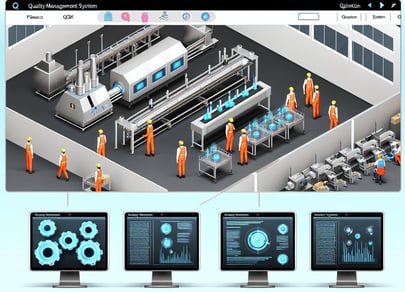Topics: Industrial Manufacturing, PlanetTogether Software, Integrating PlanetTogether, Streamlined Workflows, Continuous Improvement, Enhanced Visibility, Data Synchronization, Optimized Planning and Scheduling, Digital Quality Management Systems
As a Production Planner, you're constantly striving to optimize processes, enhance efficiency, and maintain quality standards. In this digital age, the integration of advanced technologies has become imperative for staying ahead of the curve. One such crucial integration is the implementation of digital quality management systems (QMS) for fostering continuous improvement.
In this blog, we'll look into the significance of digital QMS and explore the seamless integration between PlanetTogether and leading ERP, SCM, and MES systems like SAP, Oracle, Microsoft, Kinaxis, and Aveva, to drive operational excellence.

Digital Quality Management Systems revolutionize the traditional approach to quality control by leveraging technology to streamline processes and enhance decision-making. These systems offer a comprehensive framework for managing quality across all stages of production, from raw material procurement to final product delivery. Key features of digital QMS include:
Real-time Monitoring: Digital QMS provides real-time visibility into production processes, allowing you to identify and address quality issues promptly.
Data-driven Insights: By collecting and analyzing vast amounts of data, these systems offer actionable insights for optimizing operations and improving product quality.
Standardization of Processes: Digital QMS enables the standardization of quality control procedures, ensuring consistency and compliance with industry regulations.
Collaboration and Communication: These systems facilitate seamless collaboration and communication among various stakeholders, fostering a culture of continuous improvement.

Continuous improvement lies at the heart of operational excellence in industrial manufacturing. It involves the ongoing effort to enhance processes, reduce waste, and maximize efficiency. Digital QMS plays a pivotal role in this pursuit by providing the tools and insights needed to drive continuous improvement initiatives. Some benefits of adopting a continuous improvement mindset include:
Cost Reduction: By identifying inefficiencies and optimizing processes, continuous improvement helps reduce operational costs and improve profitability.
Enhanced Quality: Continuous improvement initiatives focus on eliminating defects and enhancing product quality, leading to higher customer satisfaction and loyalty.
Increased Efficiency: Streamlining processes and eliminating waste result in improved productivity and resource utilization.
Agility and Adaptability: Embracing a culture of continuous improvement enables organizations to respond swiftly to changing market dynamics and customer demands.

To unleash the full potential of digital QMS, seamless integration with other critical systems is essential. PlanetTogether, a leading production planning and scheduling software, serves as the backbone of manufacturing operations. Integrating PlanetTogether with prominent ERP, SCM, and MES systems such as SAP, Oracle, Microsoft Dynamics, Kinaxis, and Aveva enhances interoperability and data exchange, enabling a holistic approach to quality management and continuous improvement.
Data Synchronization: Integration ensures that data flows seamlessly between PlanetTogether and other systems, eliminating silos and discrepancies.
Streamlined Workflows: By automating data exchange and processes, integration reduces manual effort and minimizes errors.
Enhanced Visibility: Integration provides a unified view of production, inventory, and quality data, empowering stakeholders with actionable insights.
Optimized Planning: Access to real-time production data enables more accurate planning and scheduling, leading to improved resource allocation and on-time delivery.
Implementing digital QMS and integrating it with PlanetTogether and other systems requires careful planning and execution. Here are some best practices to ensure a successful implementation:
Define Clear Objectives: Clearly outline your goals and objectives for implementing digital QMS and integration, ensuring alignment with overall business strategy.
Engage Stakeholders: Involve key stakeholders from across the organization in the planning and implementation process to gain buy-in and support.
Prioritize Data Security: Implement robust security measures to safeguard sensitive production and quality data against unauthorized access or breaches.
Provide Training and Support: Offer comprehensive training and ongoing support to employees to ensure smooth adoption of new systems and processes.
Monitor and Evaluate Performance: Continuously monitor performance metrics and KPIs to gauge the effectiveness of digital QMS and integration, making adjustments as needed.
The implementation of digital quality management systems and seamless integration with production planning software like PlanetTogether and leading ERP, SCM, and MES systems are essential for driving continuous improvement in industrial manufacturing. By leveraging technology to streamline processes, enhance visibility, and foster collaboration, organizations can achieve operational excellence, improve product quality, and stay ahead of the competition.
Embracing a culture of continuous improvement is not just a strategic imperative but a pathway to sustainable growth and success in the dynamic landscape of industrial manufacturing. Are you ready to take your manufacturing operations to the next level? Contact us today to learn more about how PlanetTogether can help you achieve your goals and drive success in your industry.
Topics: Industrial Manufacturing, PlanetTogether Software, Integrating PlanetTogether, Streamlined Workflows, Continuous Improvement, Enhanced Visibility, Data Synchronization, Optimized Planning and Scheduling, Digital Quality Management Systems
0 Comments
No video selected
Select a video type in the sidebar.







LEAVE A COMMENT